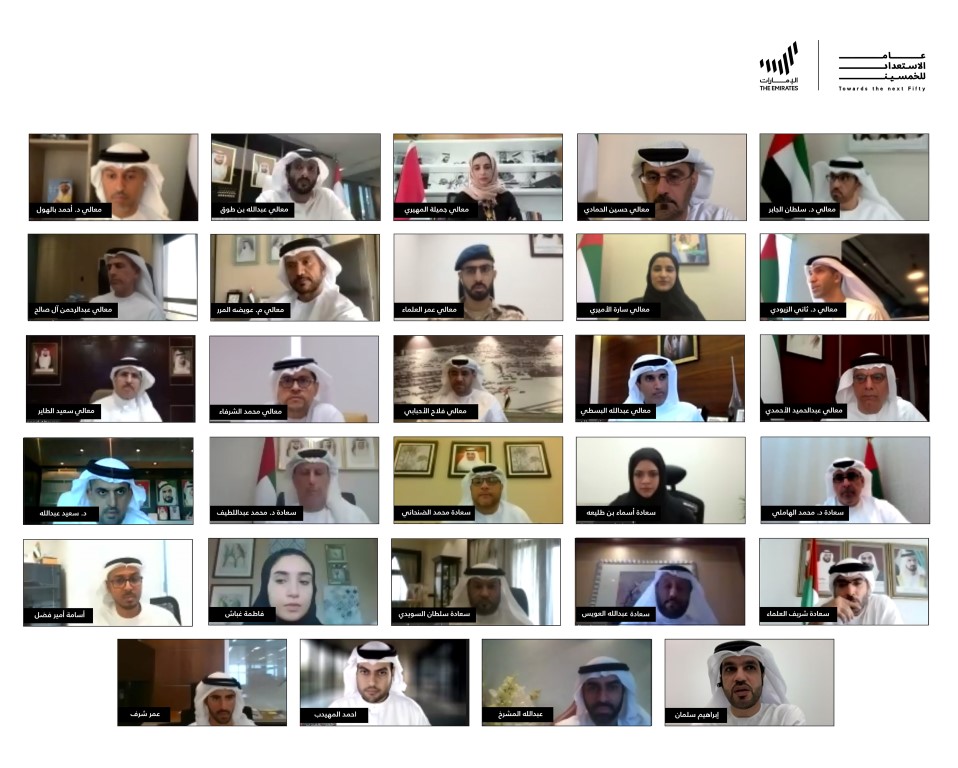
More than 1,000 ministers, and senior federal and local government officials, held 11 consultative meetings to discuss the path for the economic environment and economic models and sectors for the next 50 years.
The meetings were in implementation of directives given by His Highness Sheikh Mohammed bin Rashid Al Maktoum, Vice President, Prime Minister and Ruler of Dubai, to strengthen government integration to chart the future and lay down axes and components of the comprehensive development plan for the next 50 years.
They were held within the efforts of the 50-year Development Plan Committee, under the chairmanship of H.H. Sheikh Mansour bin Zayed Al Nahyan, Deputy Prime Minister and Minister of Presidential Affairs, to envisage features of vital sectors and conceptualise development plans and strategic directions for the next 50 years to ensure the UAE’s leading stature regionally and globally.
The consultative meetings focused on several axes, the most important of which are the business environment and stimulating entrepreneurship, foreign trade and partnerships, attracting investments, talents and skills, and building the capabilities of national cadres and qualifying them to lead the future economy, in a way that further entrenches the country’s economic leadership.
Suhail bin Mohammed Al Mazrouei, Minister of Energy and Infrastructure, affirmed that his ministry is working to develop sectors related to the “energy, infrastructure, housing and transport” system, to meet the requirements of the next stage in the country’s development process and achieve the state’s objectives in light of the global changes, by designing initiatives and ambitious work plans capable of continuing the march of achievements and crossing smoothly and powerfully for the next fifty years of excellence and global leadership.
He pointed to the ministry’s plan within the economic model and sectors for the next fifty years, during which the ministry will undertake three axes – renewable and clean energy, oil, petrochemical and mining industries, and land and sea transport and storage.
Dr. Sultan bin Ahmed Al Jaber, Cabinet Member and Minister of Industry and Advanced Technology, said, “The Ministry of Industry and Advanced Technology will work to establish a regulatory infrastructure capable of enabling and stimulating the utilisation of innovations and technologies of the fourth industrial age to drive the growth of the sector, enhance the competitiveness of our national industries and increase their contribution to the GDP, in addition to enhancing the local added value and supporting the growth of small- and medium-sized companies in the private sector.” He pointed out that the In-Country-Value programme will contribute to sharpening the competitiveness of the national industry, stimulating innovation and economic growth and creating new job opportunities, explaining that the ministry will also focus on creating the appropriate environment to stimulate the growth of promising sectors that contribute to achieving national priorities, especially during the post-COVID-19 era, which include food, water, energy and pharmaceutical industries and promoting the application of advanced technology in various sectors.
Nasser bin Thani Al Hamli, Minister of Human Resources and Emiratisation, said his ministry has Identified four main paths that will be focused on over the next 50 years, to achieve the goal of attracting global skills and competencies. These four paths, he explained, will create a workforce that matches the requirements of the labour market in the future; concentrate on a knowledge-driven economy; sustain the economic sectors and finally provide central statistical and analytical systems for high-quality labour market data through integrated records systems and programmes for anticipating future work.
Abdullah bin Touq Al Marri, Cabinet Member and Minister of Economy, said, “The preparations for the next-50-years plan reflect the importance of constant work to enhance the state’s readiness and move towards creating a better future for the next generations.”
He stressed that the transformations of the global economic landscape in light of geopolitical changes, rapid development in technology, communication mechanisms, market dynamics and the effects of the COVID-19 pandemic are all factors that have contributed to the need to review various plans, governmental and work mechanisms to ensure the continuation of the national successes achieved during the past decades.
Sarah bint Yousif Al Amiri, Minister of State for Advanced Sciences, who chairs the UAE Space Agency, said, “The space sector is possible as the head of the future economy, and we will work with an integrated vision to achieve the aspirations of the wise leadership, noting that the next stage will witness doubling the work to achieve the UAE’s vision of pioneering the space sector by qualifying a specialised generation capable of contributing to the growth of the space sector.”
Omar bin Sultan Al Olama, Minister of State for Artificial Intelligence, Digital Economy and Teleworking Applications, said the digital economy represents a fundamental driver for the implementation of the future strategies of the UAE government, and a key pillar of the preparations for the next 50 years.
“The digital economy is an important supporter of the efforts to enhance the competitiveness of the UAE at the global level, for its great contribution to economic development, providing job opportunities, new markets and emerging sectors, and its role in empowering society with the tools of the Fourth Industrial Revolution and advanced infrastructure in the field of technology and innovation,” he added.
Saeed Alahmadi, Governor of the Central Bank of the UAE, said the bank’s plan for the next 50 years is based on several major axes, which include adopting artificial intelligence, analysing big data, using digital identity and dealing with the repercussions of climate change on the banking and insurance sector. These axes represent the most prominent topics on the agendas of global central banks, he noted.












